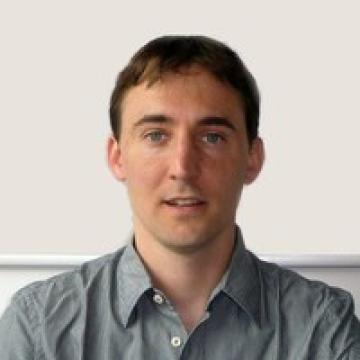prof. Martin Guilliams (PhD)

Principle Investigator – Lab for Myeloid Cell Biology (VIB-UGent)
Full professor (Faculty of Sciences, UGent)
Research focus
We study the interactions between macrophages and their microenvironmental niche. We invest heavily in technologies:
- spatial multi-omics,
- AI-driven spatial analysis,
- epigenetics,
- in vivo CRISPR screens.
Our liver cell atlas work revealed the modular architecture of the liver sinusoids, which are constituted of hepatocytes, sinusoidal endothelial cells (LSECs), stellate cells and Kupffer cells (KCs). We found that each KC projects an important part of its body across the LSEC barrier to be in close contact with a stellate cell and a hepatocyte, generating a four-cell-circuit. The genetic program of these four cells is completely integrated, with each cell representing an essential part of the cellular niche of the other cells. This suggests that throughout evolution hepatocytes, LSECs, stellate cells and KCs have become genetically integrated to function together as an interconnected functional sinusoidal module. This modular view forms the basis of our research where we aim to
- unravel the cell-cell interactions forming the blueprint of the homeostatic sinusoidal liver module,
- unravel the signals driving multiplication of liver modules during neonatal liver growth and upon regeneration,
- understand how metastatic cells hijack the liver building blocks to build their own modules.
The objective of our liver metastasis research is to study the crosstalk between the liver metastasis macrophages and the cells constituting their niche, including cancer cells, mesenchymal cells and endothelial cells. Our project involves human and murine liver samples. We hypothesize that the cancer cells rewire cell-cell circuits within the macrophage niche to manipulate macrophage activity and promote tumor expansion. The goal of our research is to understand the cell-cell interactions within the metastatic macrophage niches so well that we can rewire these regulatory circuits to block the tumor growth.
Biography
Martin Guilliams obtained his Ph.D. in 2008 at the Free University of Brussels (VUB), Belgium, in the laboratory of Patrick De Baetselier and Jo Van Ginderachter. He did his first postdoc at Centre d’Immunologie de Marseille-Luminy, France, in the lab of Bernard Malissen, and his second postdoc at the VIB Center for Inflammation Research at Ghent University, Belgium, in the lab of Bart Lambrecht. In 2015, he obtained a tenure-track professorship from the Faculty of Science at Ghent University. In 2017, he obtained an ERC Consolidator Grant and became an independent principal investigator at the VIB. He currently leads a research team that focuses on the functional specialization of mouse and human liver macrophages, with a focus on the interactions between macrophages and their micro-environmental niche and how these interactions change upon liver regeneration and liver metastasis, using single-cell and spatial proteogenomics technologies combined with in vivo CRISPR screens.
Research team
- Prof. Martin Guilliams - principal investigator, full professor
- Marie Laviron - post-doctoral researcher
- Lara Morren - master student
- Bavo Vanneste - technician
- Liesbet Martens - technician
- Tinne Thoné - technician
Key publications
- ‘Macrophage engineering as therapeutic strategy against liver metastasis’, Trends in Cancer 2024 (in press).
- ‘Transient Kupffer cell depletion and subsequent replacement by infiltrating monocyte-derived cells does not alter the induction or progression of hepatocellular carcinoma’, International Journal of Cancer 2023.
- ‘Spatial proteogenomics reveals distinct and evolutionarily conserved hepatic macrophage niches’, Cell 2022.
- ‘Single-cell profiling of myeloid cells in glioblastoma across species and disease stage reveals macrophage competition and specialization’, Nature Neuroscience 2021.
- 'Myeloid Cells TREM Down Anti-tumor Responses.', Cell 2020.
- 'Hepatocarcinoma Induces a Tumor Necrosis Factor-Dependent Kupffer Cell Death Pathway That Favors Its Proliferation Upon Partial Hepatectomy.', Frontiers Oncology 2020.
- ‘The tumour microenvironment harbours ontogenically distinct dendritic cell populations with opposing effects on tumour immunity’, Nature Communications 2016.
- ‘Identification of discrete tumor-induced myeloid-derived suppressor cell subpopulations with distinct T cell-suppressive activity’, Blood 2008.
Contact & links
- Lab Address: UGent-VIB Center for Inflammation Research (IRC), Guilliams lab, Technologiepark 71, B-9052 Ghent, Belgium
- Guilliams lab
- Liver Cell Atlas Portal
- Google Scholar
- ORCID
- X (former Twitter)
- Prof. Guilliams can provide specific platforms or services for
- Spatial omics expertise with the development of MERSCOPE and MACSima protocols to co-detect RNA and proteins in tissue sections.
- in vivo CRISPR screening expertise (PERTURB-seq-like approach combining multiple perturbations within one same tissue). - Prof. Guilliams is
- Member of VIB Spatial Catalyst to develop novel spatial
multi-omics techniques
- Member of the European Macrophage and Dendritic Cell Society
- Member of the Belgian Immunology Society
- Member of the Human Cell Atlas Consortium
- Member of the Immgen Consortium - Prof. Guilliams is interested to receive invitations for presentations or talks